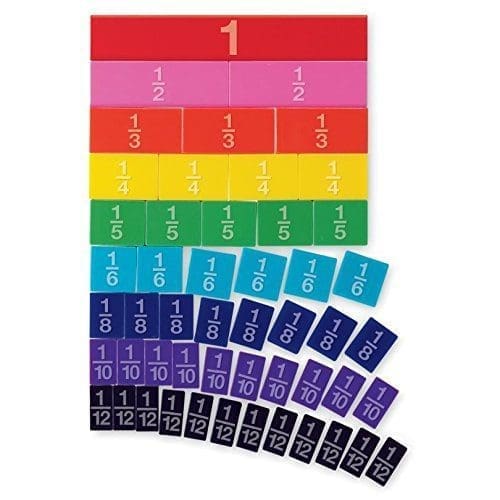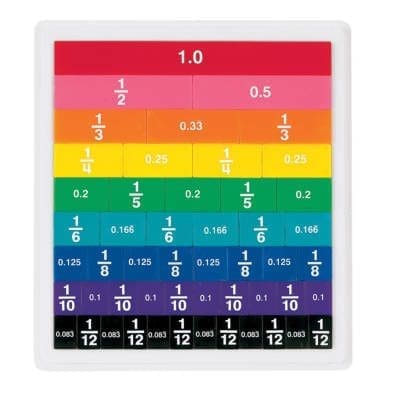
Fraction tiles, also called fraction bars or fraction strips, are the single most important manipulative you can have for teaching fractions. They are brightly colored plastic rectangles that represent a whole, halves, thirds, fourths, fifths, sixths, eighths, tenths, and twelfths. Each tile uses the same-sized whole. You can even buy fraction tiles marked with decimal equivalents, as pictured below. While other manipulatives such as Cuisenaire Rods and pattern blocks are also great for building understanding of how fractions work, the tiles are necessary.

As I have written in Teaching Fractions, “fifth graders’ fraction knowledge predicts high school students’ algebra learning and overall math achievement… and yet 6th/8th graders answer fraction operation questions correctly only half of the time” (The Scientific American) And as I also wrote in that post, the answer I have found is much more time for students working with concrete manipulatives. It is so important to not rush through that stage in initial instruction, and to give students opportunities to continue working through them throughout the year.
Skills Taught With Fraction Tiles
Skills you can teach directly by using fraction tiles include comparing and ordering fractions, mixed numbers, finding common denominators, equivalent fractions, and all fraction operations, as well as ratios. The key is in asking questions and guiding kids to vocalize the patterns they see. They will start to see relationships and to discover “tricks” for themselves. Then, not only will they no longer need the manipulatives, they will understand how and why the math works.
Activities and Games Using Fraction Tiles
3rd grade lesson using tiles to compare fractions and create equivalent fractions
Dividing fractions using tiles
6th grade video on teaching with fraction manipulatives
Student Created Fraction Tiles
While I believe having the premade fraction tiles is necessary, I do also have students make their own. The kinesthetic practice helps deepen understanding and create long term memory. It also gives students a manipulative set they can keep with them for use during free time or at home. Here is a lesson for doing so (it says third grade but could be any grade third and up). I recommend having kids create during small group instruction so that you can make sure their folds and proportions are correct- if they make their strips incorrectly the lesson will do more harm than good. If you can’t closely supervise the folding another option is to have students use a template such as this one. Their strips will be accurate but the learning isn’t as deep as when they fold their own.
Virtual Fraction Tile Manipulatives
Virtual fraction tile manipulatives are available online. These should not be used in place of physical manipulatives but are great for displaying on your smart board to model problem solving. They are also a good addition for student practice that falls in between concrete and pictorial. Some options are:
- Mathigon Polypad my favorite source for virtual manipulatives includes both fraction bars and circles
- ABCYA fraction, percent and decimal tiles (also free for iPad)
- Math Playground fraction bars
- Math Playground fraction scales. (for comparing fractions and exploring equivalents)
- Math Learning Center fraction app (free for iPad, web and chrome)
